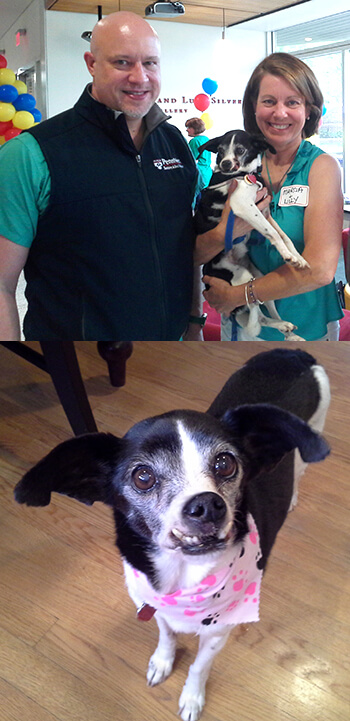 Rescuing pets in need seems to run in my family. At last tally, my siblings and I have adopted more than two dozen dogs and cats, not including 14 kittens I rescued on a whim when I learned they were going to be euthanized.
Rescuing pets in need seems to run in my family. At last tally, my siblings and I have adopted more than two dozen dogs and cats, not including 14 kittens I rescued on a whim when I learned they were going to be euthanized.
People often ask me about my special needs pets: three cats missing various appendages, plus my dog, Lilly, whose face has been reconstructed. My interest in animals with special needs began with Columbus, a blind cat I adopted in 2000. At first I felt sorry for Columbus, but soon I realized that animals don’t feel sorry for themselves and don’t know they have limitations. Columbus was intrepid and more fearless than my cats with sight. He taught me about determination and perseverance, and brought love to everyone who had the honor of knowing him.
It thus made sense when my friend, Liz Howard, asked me if I would adopt Lilly, a Beagle-Chihuahua mix Liz had rescued from a Virginia shelter. Lilly had been dumped after being shot in the face. Somehow Lilly survived, despite having a large hole in the roof of her mouth.
Although several vets recommended that Lilly be euthanized, Liz approached a friend at Penn, who suggested that Lilly be examined at Penn Vet’s Ryan Hospital. Dr. Alexander Reiter, Professor of Dentistry and Oral Surgery, reviewed Lilly’s case. While he was optimistic at first, his optimism faded when he saw the size of Lilly’s wound. Dr. Reiter suggested an experimental surgery to close the hole in Lilly’s mouth. As this was Lilly’s only chance, Liz agreed to have the surgery performed.
Several diseased teeth around the wound were extracted during a first anesthetic procedure. Eight weeks later, three oral flaps were created to completely close the palatal defect. The surgery was a success! Lilly was able to eat and drink properly for the first time since her accident.
After I adopted Lilly in 2004, I took her to Ryan Hospital for a follow-up visit with Dr. Reiter. This marked the beginning of my relationship with Penn Vet. Several years later, when Lilly developed a stubborn nasal infection, we returned to Ryan Hospital, where Lilly received excellent care. Two years ago, Lilly was diagnosed with a brain lesion. Once again, I turned to Dr. Reiter for advice and support. He reminded me of Lilly’s spirit and will to survive. He was right.
Despite her physical challenges and numerous surgeries, Lilly has remained a very loyal and sweet dog. She loves children and patiently sits still while they pet her. Last year, Dr. Reiter invited Lilly and me to Penn Vet’s Best Friends Bash, held in conjunction with the Children’s Hospital of Philadelphia and the Center for Human Appearance. This annual event brings children with craniofacial differences together with former canine patients of Dr. Reiter. Lilly fit right in among the children and dogs.
Dr. Reiter’s commitment to helping animals and children inspired me to add Penn Vet to my planned giving. Lilly is now almost 15 years old. Although she is nearly blind and deaf, and suffers seizures, I know that Dr. Reiter and Penn Vet are always here for us. There is no greater way for me to honor Dr. Reiter than to provide a financial gift to Penn Vet. When Lilly moves on to her next adventure, I also plan to donate Lilly’s body to Ryan Hospital, so that Dr. Reiter can complete the circle of Lilly’s life and Lilly can help the next animal or child in need of complex treatment. Just like Columbus, Lilly has exhibited sheer determination and taught everyone around her what it means to overcome huge obstacles.